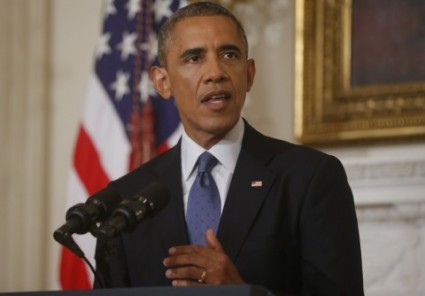UPDATE 1900 GMT: A briefing by a “senior US administration official” supports our analysis, both over US cooperation with Iraqi and Kurdish forces before the decision for airstrikes and the catalyst of the Islamic State’s threat to the Iraqi Kurdistan capital of Erbil:
On Saturday night, ISIL launched a multipronged attack really across hundreds of kilometers in northern Iraq. It was swift; it was effective. They used — they acted with tremendous military proficiency. We immediately began to coordinate through our joint operation centers with the Peshmerga commanders and significantly with the Iraqi air force and Iraqi Security Forces in Baghdad. And we began to develop what was really a fairly historic level of cooperation between the Iraqi air force and the Peshmerga providing tactical airstrikes on the ground.
As we have seen in other circumstances, however, ISIL, given the rapidness in which it is able to maneuver, given its ability to direct indirect fire attacks followed by direct assaults with heavy weapons, it is a militarily proficient organization….
So we were coordinating with the Peshmerga and the Iraqi air force to some good effect. And last night, ISIL launched another series of attacks, which changed the dynamic once again, particularly potential approaches into Erbil. And that gets to what the President discussed in his statement today with actions that we are now willing to take should they advance further towards Erbil.
UPDATE 1430 GMT: Washington has acknowledged US airstrikes for the first time.
The Pentagon Press Secretary, Rear Admiral John Kirby, said two F/A-18 jets dropped 500-pound bombs on a piece of artillery and the truck towing it. The weaponry was to be used to shell Kurdish forces outside the Iraqi Kurdistan capital Erbil.
US military aircraft conduct strike on ISIL artillery. Artillery was used against Kurdish forces defending Erbil, near US personnel.
— Rear Adm. John Kirby (@PentagonPresSec) August 8, 2014
The number of casualties in unknown.
Kirby said the jets took off from the aircraft carrier USS George HW Bush in the Persian Gulf.
After months of advance in Iraq by the Islamic State, The US has begun airstrikes against the jihadists, as well as dropping food and water to tens of thousands of refugees in the northwest of the country.
Following hours of reports on Thursday evening of attacks, President Obama announced that he had authorized limited attacks.
President Obama on Thursday announced he had authorized limited airstrikes against Islamic militants in Iraq, scrambling to avert the fall of the Kurdish capital, Erbil, and returning the United States to a significant battlefield role in Iraq for the first time since the last American soldier left the country at the end of 2011.
“Earlier this week, one Iraqi cried that there is no one coming to help,” Obama said. “Well, today America is coming to help.”
While the crisis of up to 40,000 Yazidis — members of a faith mixing ancient Zoroastrianism, Islam, and Christianity — on Mount Sinjar provided a reason for action, the immediate cause appears to be fear that the Islamic State’s offensive would now move on the capital of Iraqi Kurdistan, Erbil.
Having worked with insurgents to take cities in western and northern Iraq, such as Fallujah, Mosul, and Tikrit, the Islamic State began seizing territory from Kurdish forces, who offered little resistance, in northwest Iraq last week. The advance started with the capture of the city of Sinjar, prompting the flight of tens of thousands of residents, including Yazidis.
Iraqi Kurdistan President Massoud Barzani ordered Kurdish peshmerga “to attack the terrorists and the enemies of the people and the land of Kurdistan with all their power”; however, the Islamic State continued to hold the upper hand.
The latest areas — including Iraq’s largest Christian town of Qaraqosh — fell on Thursday, with no prospect of a halt to the jihadists’ attacks as they moved within 30 miles of Erbil.
Obama said that there had been no US airstrikes at the time of his speech, but attacks were reported from late Thursday afternoon — with the likely source being either US or Turkish warplanes.
Kurdish and Iraqi officials said airstrikes were carried out on the towns of Gwer and Mahmour. EA sources also reported strikes on Kalak near Erbil.
Any US action was likely arranged with Ankara and Iraqi Kurdistan, which has pondered independence from Iraq since a surge in the insurgency took Mosul, Iraq’s second-largest city, in June.
The US had previously hesitated to take military action beyond the despatch of 300 advisors and special forces to Iraq. The Americans had hoped that Prime Minister Nuri al-Maliki could find a way to stabilize the political and military situation, had feared that attacks would alienate Iraqi Sunnis who have been angered with the Shia-led Government over its approach to politics and security, and had worried that aggressive operations would increase the risk of a fragmentation of the country.

